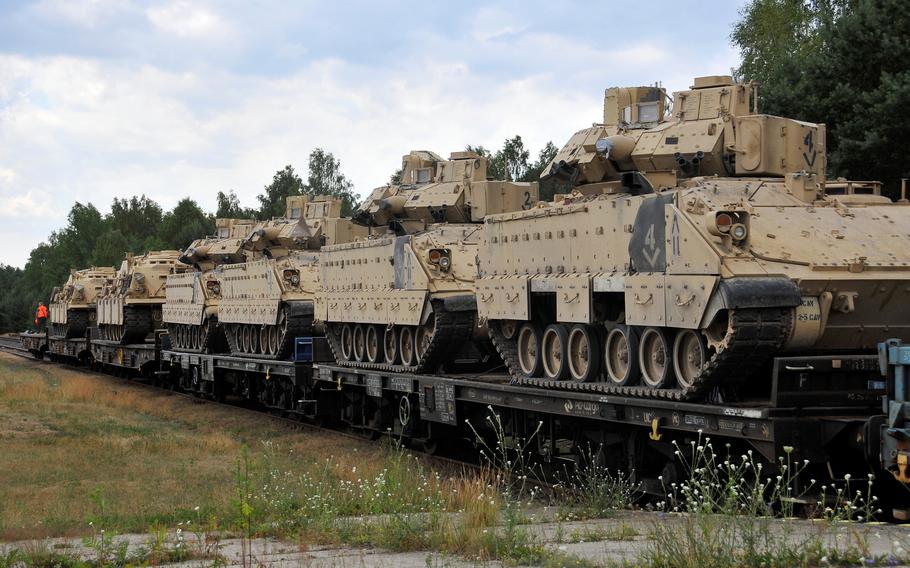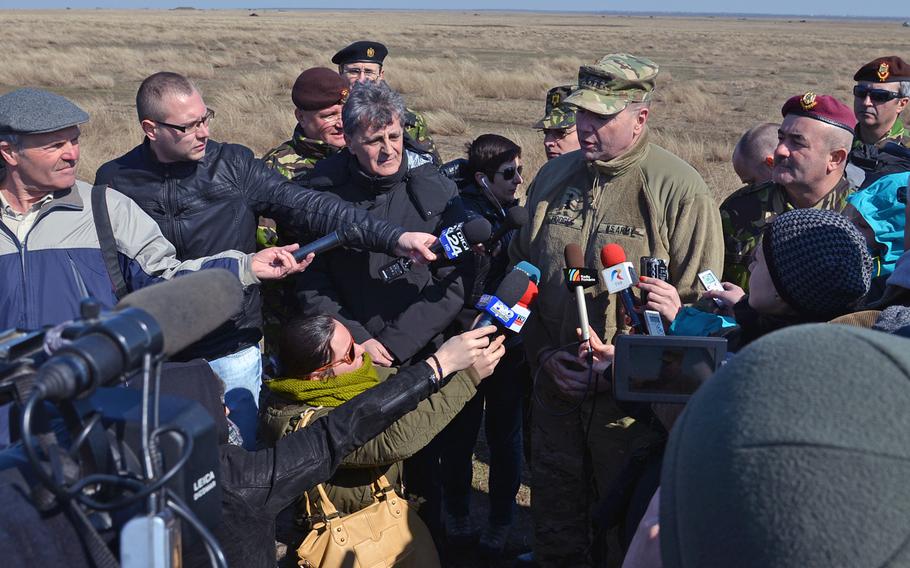
Soldiers from 1st Armored Brigade Combat Team, 1st Cavalry Division, load their vehicles and equipment during Atlantic Resolve at Zagan, Poland, in 2018. At the time, concern of provoking Russia was likely the major factor that kept the U.S. from upgrading a mission meant to deter Moscow to a contingency operation. (Charles Rosemond/U.S. Army)
STUTTGART, Germany — The idea of turning U.S. European Command’s Atlantic Resolve campaign into a full-fledged contingency operation used to set off alarms in Washington, where concerns about provoking Russia were intense enough to land outspoken generals in the doghouse.
On Thursday, the Pentagon reversed course and announced EUCOM’s 9-year-old Atlantic Resolve mission that has deployed thousands of troops over the years to defend NATO’s eastern flank was reclassified as a contingency operation, which brings with it an array of new authorizations.
The change gives EUCOM more operational flexibility and includes added entitlements for reservists, who will receive the same benefits as active-duty personnel, the Pentagon said.
In the aftermath of Russia’s initial 2014 invasion of Ukraine, a push was already underway by U.S. military officials in Europe to get the new Atlantic Resolve effort focused on countering Russia upgraded into a named military operation.
Those attempts were shot down repeatedly. The likely reason was angst about antagonizing Russia and ambivalence about a more robust military mission on the Continent, the former head of the Army in Europe said Friday.
“The (Obama) administration was super sensitive to anything that might be seen as provocative to Russia,” retired Lt. Gen. Ben Hodges said. “(Former national security adviser) Susan Rice even told EUCOM for a while that I could not go to Ukraine without her approval, even though we had troops there training Ukrainian troops.”

Ben Hodges, then a lieutenant general and U.S. Army Europe commander, is interviewed by reporters at the Smarden Training Area in Romania in 2015, after watching the 173rd Airborne Brigade parachute into the training area. Hodges was an early proponent of upgrading the Atlantic Resolve mission in Europe to a contingency operation, but he faced pushback from Washington at the time. (Michael Abrams/Stars and Stripes)
During his 2014-17 tenure as head of the Army in Europe, Hodges and then-EUCOM chief Gen. Philip Breedlove often were more outspoken than the Pentagon about the implications of Russia’s armed takeover of Crimea from Ukraine and what it meant for security in Europe.
The idea of making Atlantic Resolve a contingency operation already was being advocated by Hodges.
“But we were consistently rebuffed by the (Joint Staff),” he said.
Nearly a decade later, Russia’s full-scale invasion of Ukraine and ongoing occupation of the southern and eastern parts of the country forced the Pentagon to reconsider.
Because of the growing size of the mission, which has involved thousands of additional troops since the invasion began Feb. 24, 2022, more support is needed, Lt. Gen. Douglas Sims, director for operations at the Joint Staff, told reporters Thursday.
“Lastly, this reaffirms the unwavering support and commitment to the defense of NATO’s eastern flank in the wake of Russia’s illegal and unprovoked war on Ukraine,” he said.
Hodges said the change amounts to a recognition by the Defense Department and the Joint Staff that Operation Atlantic Resolve needs to be higher on the military funding pecking order.
“This is a big deal,” he said. “This will raise its priority, which will help it compete in the Pentagon’s resourcing process with other requirements around the world.”
Retired Brig. Gen. Timothy Daugherty, one of Hodges’ deputies at the time, concurred, saying the changes could affect everything from troop awards to how military construction projects get carried out.
“The evolution makes competing for resources much cleaner and more sustainable on a longer basis,” Daugherty said. “It is basically a separate bucket of money in the budgeting process.”